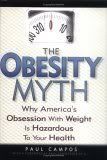
I've been reading a lot recently about the obesity myth (and the book by the same name
Similar to the argument I put forth in my post about the unintended consequences of car-seat and cosleeping safety, attacking weight "problems" often promotes anorexic and pro-eating disorder behavior that is undeniably more dangerous than the "excess" weight would have been.
Below are some quotes from the article, which is itself an excerpt from the book
• The health risks associated with increasing weight are generally small, in comparison to those associated with, for example, being a man, or poor, or African American.
• These risks tend to disappear altogether when factors other than weight are taken into account. For instance, fat active people have half the mortality rate of thin sedentary people, and the same mortality rate as thin active people.
• There is no good evidence that significant long-term weight loss is beneficial to health, and a great deal of evidence that short-term weight loss followed by weight regain (the pattern followed by almost all dieters) is medically harmful. Indeed, frequent dieting is perhaps the single best predictor of future weight gain.
Nowhere is our skewed perception of what is an "acceptable" body type put more to the test than with our babies. Babies don't know how to diet; babies don't know how to sculpt their abs or slim their thighs; babies are just whatever shape they are, and there really is a great deal of variation in what shapes are available. And, since they're babies, any of those shapes is ideal. And that just doesn't seem to right to us, in our thinness-obsessed culture, where only a handful of similar body shapes are correct.
The truth is that to be fat in America today means to weigh more than whatever a person's particular social milieu considers appropriate. This means it is perfectly possible - and in a certain twisted sense even 'reasonable' -- for a 130-pound white college student of average height to consider herself 'fat', while a working-class African-American woman who weighs 50 pounds more is not likely to think of herself as 'overweight' (and she, too, will be correct in her self-assessment). In other words, fat in America is a state of mind, rather than some objective fact about our bodies.
Being the mother of a "large" baby, I've gotten my share of comments about how fat a baby he is. But the thing is, he's not fat. He's exactly the right size. There's nothing medically wrong with him, and nothing would be gained in health by helping him lose weight. It sounds ludicrous even to talk about it with regards to a baby. In fact, if he didn't gain weight, his health would be in danger. For instance, underweight babies are set up for many more and more severe health problems than supposedly overweight babies, but despite this, some doctors and hospitals are sounding the alarm about "fat" babies. And since Mikko's breastfed on cue (his body's cues), he's regulating his weight all on his own with no help or hindrance from me. This is mindblowing in our culture of always needing to monitor our caloric intake and feel guilty for enjoying foods, of labeling some foods "good" and some "bad."
I do not argue that there is no relationship between weight and health. I argue, rather, that the health risks associated with higher-than-average weight have been greatly exaggerated, while all sorts of related but far graver risks have been ignored. In particular, poverty, poor nutrition and a culture that makes it easy for Americans to be sedentary are important public health issues in America today.
Certainly, as Mikko moves more and more into the land of solid foods, I want to make sure that I navigate around some of the hangups and issues I have had with food. Mostly, I want to stay out of his way and let him continue to be his own ideal self, with his own ideal body type and size. And I want him to accept and love that body of his.
The rejection of the war on fat is based on a simple principle: that tolerance towards an almost wholly benign form of human diversity is the least we should expect of ourselves, if we wish to lay claim to living in a civilized culture. The war on fat is an outrage to those values that American culture celebrates (often with good reason) as essential features of our nation's character -- of equality, of tolerance, of fairness, and indeed of fundamental decency towards those who are different. And in the end nothing could be easier than to win this war: all we need to do is stop fighting it.
P.S. I'm on vacation this week, so posts might be more sporadic. Cheers!









 I'm Lauren Wayne, writer and natural parent. I embrace attached parenting with an emphasis toward green living.
I'm Lauren Wayne, writer and natural parent. I embrace attached parenting with an emphasis toward green living. 


0 comments:
Post a Comment